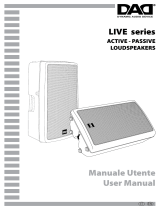
NM250A 2-way, bi-amplifed, active loudspeaker system
Important !
10
ENGLISH
• Always make sure that the 'Line/mic' switch is up.
• If the mixer has XLR balanced outputs: use standard balanced
XLR connectors.
• If the mixer has XLR unbalanced outputs: in this case, unless
using a Montarbo mixer, make sure that the XLR outputs on the
mixer are unbalanced to IEC 268 standard: 1 = GND, 2 = HOT,
3 = GND.
• If the mixer has JACK balanced outputs (stereo jacks): it is
possible to use stereo Jack-stereo Jack cables or stereo jack-XLR
adapters, wired according to IEC 268: pin 1 = ground (sleeve),
pin 2 = tip, pin 3 = ring.
• If the mixer has JACK unbalanced outputs (mono jacks): use
suitable Jack-XLR male adapters unbalanced according to IEC 268:
pin 1 = ground, pin 2 = tip, pin 3 = ground
See 'connectors' at page 25.
Parallel connection of two or more systems:
• Always make sure to use only heavy gauge, high quality SHIELDED
cables. Connect the LINK OUT of the rst NM250A to the input (MIC)
the second one (make sure that the 'Line/mic' switch is up) the LINK
OUT of the second system to the input of the third one and so on.
See 'connection example' at page 26.
Input sensitivity and clipping.
Every amplied speaker system is characterized by a value of input
sensitivity. The sensitivity is dened as the value of the amplier's
input signal that will result in maximum power output. An increase
in input signal over that threshold will result, not in increased power,
but in a distortion phenomenon called 'clipping' (output stage
saturation).
In this condition, the speaker will operate improperly. The diaphragm
will exceed it's excursion limits, and the voice coil will overheat
beyond it's thermal limits, resulting in overheating and premature
failure. The active processors will help in avoiding clipping, by
reducing the amplier gain and thus the input sensitivity, but this
type of protections may be overridden in very extreme conditions.
What the active processor cannot modify is a signal that is distorted
before getting to the active speaker's input.
The effects of this type of signal are the same as described above.
How to avoid clipping
The simplest way to avoid clipping is to check each level in the
signal's chain. Start from each input channel of the mixer and adjust
the gain control and the equalizer's controls so that the PFL meter
will never (or only occasionally) indicate more than 0dB. In simpler
mixers, check that the 'clip' or 'peak' indicator is always off, or
blinks only occasionally.
If these levels are exceeded, reduce the channel's input gain.
Once the desired mix is obtained, adjust the output level so that it
never exceeds the active speaker's or the power amplier's input
sensitivity, as displayed on the master output VU-meter.
In model NM250A the input sensitivity is -10dBu.
Product care and maintenance:
• Never expose the enclosure to heat sources (heaters or other
products that produce heat).
• Never place burning candles or other sources of open ame on
top of the device.
• Never expose the enclosure to direct sunlight, excessive vibrations
or mechanical shocks.
• Avoid operating and storing the enclosure in damp or dusty
places: this may lead to malfunctions and premature degrading
of specications.
• Avoid using the enclosure close to strong sources of
electromagnetic interferences (e.g. video monitors, high power elec-
trical cabling). This may lead to degradation of audio quality.
• When setting up the system up outdoors, be sure to protect it
against rain.
• Care should be taken so that objects do not fall and liquid is
not spilled onto the enclosure. In public event don't let people,
musicians, technicians or anyone put glasses, cups, ashtrays or
cigarettes on the enclosure.
• Always leave the protective grid mounted on the enclosure.
• Use a soft brush or a jet of air to clean the enclosure.
Do not use alcohol, solvents or detergents.
• Take care of your connector cables. Make sure that they are not
damaged, knotted or twisted.
• Do not force connectors and controls.
• Make sure the mains power switch is off ('0') before starting any
connection.
• As long as it is plugged in there can be potentially dangerous
electrical potentials inside the device, so, before undertaking any
sort of maintenance work etc., always make sure it has been
unplugged from the mains socket.
Power supply connection:
• Make sure the mains power switch is off ('0').
• Check that mains voltage corresponds to the voltage indicated
on the panel, under the mains socket.
• Use only the factory supplied mains cable or, if a different plug
style is needed, a suitable cable with a ground connection and
marked with the safety approvals valid in the country of use.
• Leave enough room to get to the mains power socket and the
mains connector on the back panel.
As long as it is plugged in there can be potentially dangerous
electrical potentials inside the device, even when the mains switch
is in the '0' (off) position and the power indicator is off so, before
undertaking any sort of maintenance work etc., always make sure
it has been unplugged from the mains socket.
Connection to the mixer:
• Always use only heavy gauge, high quality SHIELDED cables
(signal cables).
• Always make sure that the
mixer and the powered enclosures
are switched off before connecting them.
This will to avoid annoying noises and signal peaks, which can
also be dangerous for the enclosures themselves.

















